For truth, justice, and dignity
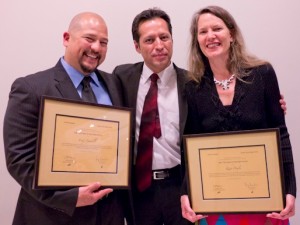
Fredy Peccerelli and Kate Doyle with Nestor Villatoro. The identification of the bones of Nestor’s father by Peccerelli’s team was a breakthrough in establishing the military’s responsibility for the disappeared in Guatemala. Photo by Richard Bermack.
Editor’s note: The following are the edited speeches by the recipients of the 2012 ALBA/Puffin Award for Human Rights Activism and the ALBA/Puffin Student Activist Award, presented at the Museum of the City of New York.
Fredy Peccerelli: I want to begin by thanking the Abraham Lincoln Brigade Archives and the Puffin Foundation for honoring the work of the Guatemalan Forensic Anthropology Foundation and for recognizing the importance of the process of the search for truth and justice in Guatemala. This award has already raised awareness about the work of the FAFG and the need to find the 200,000 victims of Guatemala’s armed conflict, and will continue to do so for a long time.
It is a great honor and a privilege to share this award with Kate Doyle. I could not think of a more deserving individual. Her work has directly contributed to the search for truth and justice in Guatemala and has impacted my life personally. You’re my hero, Kate!
I would like to thank:
All the members of the Fundacion de Antropologia Forense de Guatemala (FAFG), specially the board of directors: Jose Suasnavar, Claudia Rivera, Nancy Valdez, Leonel Paiz, Renaldo Acevedo, Shirley Chacon. Also, FAFG directors Bertony Giron and Silvia Pellecer, as well as La Verbena Cemetery Project Coordinator Jessika Osorio.
The many human rights organizations that have worked side by side with us for the last 20 years, specially Grupo de Apoyo Mutuo (GAM), CONAVIGUA, Famdegua. Also CALDH, Fundacion Myrna Mack, ECAP and the Amancio Villatoro Foundation.
I would like to thank all of the archivists at the Guatemalan Historical National Police Archive and the prosecutors at the Guatemalan Attorney General’s Office.
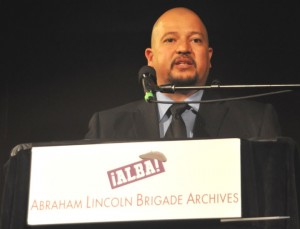
Fredy Peccerelli, winner of the 2012 ALBA/Puffin Award for Human Rights Activism, addresses the audience at the Museum of the City of New York, May 13, 2012. Photo Len Tsou
I would like to thank our many U.S. supporters and friends, specially Clyde Snow, Kate Doyle, Pamela Yates, Paco de Onis, Peter Kinoy, Scott Greathead, Holly Montufar, John Crews and Almudena Bernabeu.
To my family: my kids Ashley and Tristan, my Mom and Dad, to Jessy my love and to Bianka, Antonella, Tony, Jeannette, Mama Toya, Walter and William, I love you all. Thank you for always supporting me and the FAFG.
I humbly accept the 2012 ALBA/Puffin Human Rights Activism Award on behalf of the 136 members of the Guatemalan Forensic Anthropology Foundation. We hope that our work honors the memory of the thousands of brave men and women who fought against tyranny during the Spanish civil war as part of the Abraham Lincoln Brigade.
The FAFG is a scientific organization comprised of young Guatemalans who dedicate their lives to search for the 200,000 victims of Guatemala’s armed conflict. The process takes us on a journey to try to understand who the victims were, how they were tortured and executed, in many cases where their bodies were disposed of, and in the case of the 45,000 victims of enforced disappearance, the fact that the families still don’t know what happened to them.
This search for truth begins with the families requesting an investigation that they hope can lead to the recovery of the bodies of their loved ones and to the truth of what happened to them. If we know where the bodies might be buried, we search for the graves and conduct the exhumation to recover the bodies, analyze them, and eventually extract DNA to compare the profiles of the victims to the profiles of the thousands of family members looking for their loved ones.
The work we carry out is made possible first and foremost by the thousands of brave survivors, witnesses, and relatives who have never stopped searching for their loved ones, for truth, and for justice. Their trust in the FAFG is the first of many steps in the search, recovery and identification of the bodies of the disappeared. It is also made possible by brave prosecutors of the attorney general’s office, who now understand the need for this work, not only to identify and return the bodies to their families, but also the need to document the causes of death and present the evidence of the crimes in the search for justice for thousands of Guatemalans still coping with the repercussions of impunity in these crimes. It is made possible by the people of the Netherlands, Sweden, and the U.S., through the support of their state development agencies and their support to the FAFG through the United Nations Development Program.
The search for truth and justice through science, with the support and trust of the families of the victims, has now turned into a national movement, a process that involves many people and organizations. This long process withstood many obstacles, including death threats and lack of official Guatemalan government interest, but it has now become a necessity, a new tool, and new hope for the families and the country.
I want to end by dedicating this award to the 201 victims of the Dos Erres Massacre, the 268 victims of the Plan de Sanchez Massacre, the 424 victims of the Cuarto Pueblo massacre, the 177 women and children executed at the Rio Negro massacre, and to the victims of all the massacres in Guatemala. But not only to them. Also to Amancio Villatoro, Sergio Linares, Juan de Dios Samayoa, Hugo Navarro, Moises Saravia, and the other 178 victims that appear in the Military Diary, as well as the other 45,000 victims of enforced disappearance. My message to you is “We are looking for you and we will find you. Your stories will be told to every Guatemalan and to the world.” For truth, for justice, and for dignity!
Kate Doyle:
Thank you so very, very much. It is so exciting to be here. I am grateful to everyone who made this possible, and to everyone who has come and turned out in such a wonderful way to accompany us today.
I need to thank in particular a few institutions that have meant so much to us. First to the Puffin Foundation, to the Rosenstein family: it’s been a wonderful pleasure meeting you. It is a great honor to accept this award from your family and your foundation, so thank you.
I also want to thank the Abraham Lincoln Brigade Archives: Marina Garde, the executive director, and Sebastiaan Faber, and all the people on the board of ALBA. It is an organization that especially speaks to me and to the work we do at the National Security Archive. ALBA is engaged in what we call in Latin America “the recovery of historical memory”: that is, the rescue and the preservation of many human individual experiences, on the one hand, but also the restoration of a shared history, a collective history, our history. In the case of the Abraham Lincoln Brigade it’s the history of these 2,800 American citizens who left the safety of their lives, their worlds, to join the fight against international fascism as it played out on the battlefields of Spain. And that is the case of human rights activism all over the world: a recognition of the imperative of engagement in order to right wrongs so grievous that we have no other choice but to join the struggle.
I have to thank my own organization, the National Security Archive, which has been a standard for activism, engagement, scholarship, and history.
And a special warm thanks to “Granito” and the team at Skylight Pictures for helping tell the story not only of what Fredy and I did, but of the work that goes on in Guatemala every day.
This is Mother’s Day, as Andrew has already so aptly pointed out, and I think we should recognize the central role that mothers have played in every human rights struggle around the world… whether you are talking about the Madres, or the Abuelas, of the Plaza de Mayo in Buenos Aires, Argentina, or the Mothers of Srebrenica, or Mothers for Peace here in the United States. I am a mother too. I have two beautiful children who have supported me every step of the way in the work that I do—Ruby and Emma Doyle—they are here today. So is my husband, Tim Weiner; my mother-in-law, Dora Weiner; my own mother; my own father; my three sisters; their sweethearts; their children Ben and Eliza…. I get to work surrounded by this network of affection and support. And in Guatemala, too, Fredy and I work within a web of extraordinary colleagues.
It is wonderful to be honored in this way for the work that we do. But it is also strange, in a way, to have been plucked out of a line where we stand shoulder to shoulder with hundreds and hundreds of other amazing activists and lawyers and human rights investigators and family members and other ordinary citizens who collaborate to try to uncover the hidden history of violence in a country better known for its silence and impunity and injustice. Your award honors all of us and I thank you very much.
My message to you is “We are looking for you and we will find you. Your stories will be told to every Guatemalan and to the world.” For truth, for justice, and for dignity!
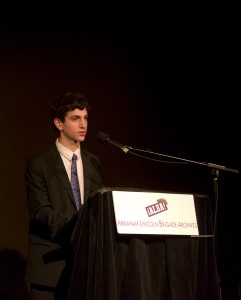
New Jersey Bergen Academies student Andrew Plotch accepts the 2012 ALBA/Puffin Student Activist Award. Photo Richard Bermack.
Andrew Plotch: Three Men, Two Horses, One Inspiration
There I stood, staring at three men who were staring down the barrels of their rifles. They leaned over two horses’ bodies. Blood pooled on the ground. Yet the men stood attentive. Just like me, they were ignoring their surroundings, only looking at what lay before them. People say a photo is worth a thousand words, but I disagree. Sometimes it is worth much more. This photograph defines a lifestyle, and not just any lifestyle, but one I knew I had to have. It defines an activists’ life; one spent fighting injustice no matter the odds, no matter the consequences. As I stood looking at “Man Behind the Barricade” by Centelles, I felt inspiration running through my veins. I stared at a photograph of men who sacrificed everything they ever had and ever would have to be in this particular place on this particular day. It was an awe-inspiring moment.
Over the past several months I have learned about a group of men whom I never heard of, who fought in a war I knew practically nothing about. These months, and the Abraham Lincoln Brigade, have opened my eyes to a world of people who care about righting the wrongs in the world to an extent I have never seen before. The members of the Abraham Lincoln Brigade were willing to challenge societal norms and in doing this they changed the world. Among the volunteers there was a shared understanding of the dangers of fascism. While their own government created an Act of Neutrality, members of the Abraham Lincoln Brigade traveled thousands of miles to risk their lives on the battlefields of Spain. They hiked across the Pyrenees to help people they had never seen or met, and they overcame generations of prejudice to work for an African-American Commander, Oliver Law.
They have inspired me to be a more politically active part of the world around me. Persistently fighting for justice, the veterans of the Abraham Lincoln Brigade proved themselves to be lifelong activists against injustice. From grassroots efforts to educate the public about the Spanish Civil War to moving furniture back into households after evictions during the Great Depression to protesting the Vietnam War, they made activism their life’s work. Not only were these volunteers active their entire lives, but now the Abraham Lincoln Brigade Archives and the Tamiment Library continue this legacy. They are politically active groups devoted to inspiring and educating young activists.
I have been alive for 16 years, but have actually been politically active for just the last few. Yet, over the past few months, since learning about the Abraham Lincoln Brigade, I have taken it up another notch. Since fall, I have petitioned, occupied, organized and fought apathy. Yet this is only the beginning. As my life continues my activism efforts will only grow. One day, when I look back on how I became so active, my mind will return to the day at NYU when I stared at men who put their lives on the line in the name of justice.

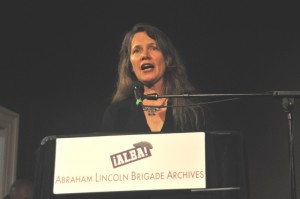
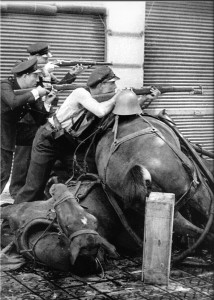












The World needs more Andrew Plotchs! Many more!